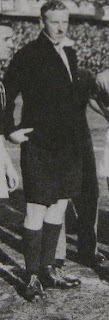I'm not here debating the reality of what he's saying, but I do question his opinion that this "branding" is new or bad.
The idea of creating a persona outside of your own to further yourself, especially in work, is something I've always considered to be one that's fairly public. Public, practiced and unashamedly encouraged.
 In my opinion, it's this branding that separates good journalists from bad ones. While I don't agree with everything Mr. Weingarten says, I fully appreciate and respect his integrity. He reports as he sees it, and that's exactly what I want from my journalists.
In my opinion, it's this branding that separates good journalists from bad ones. While I don't agree with everything Mr. Weingarten says, I fully appreciate and respect his integrity. He reports as he sees it, and that's exactly what I want from my journalists.However, other people don't want what I want. It's unfair of Mr Weingarten to assume negativity onto something while simultaneously proclaiming to be some kind of author of universal truths and noble causes. While he and I would rather a reporter's integrity be paramount, other people may want to read a sensationalist piece that embellishes and thrills rather than lists and teaches.
In my opinion, Mr Weingarten's piece is worth reading if only for the vitriol with which he splutters about how things have changed. His passion isn't a rare thing, but unfortunately seeing it in such a huge publication is.



